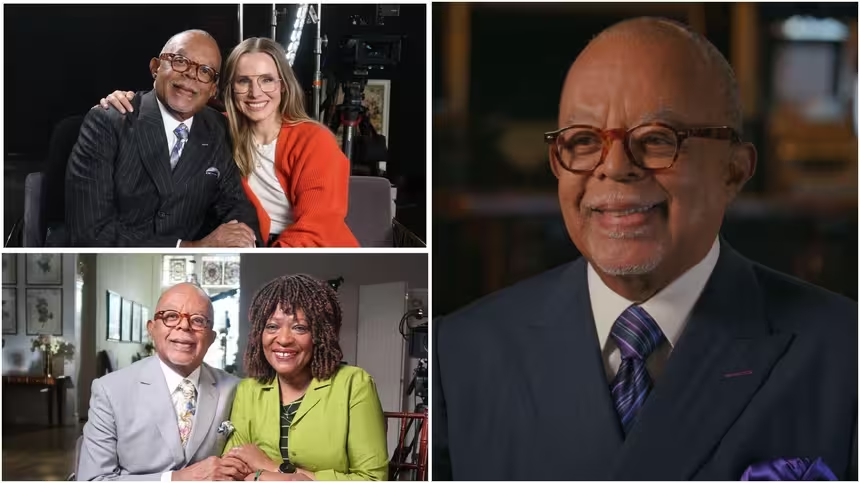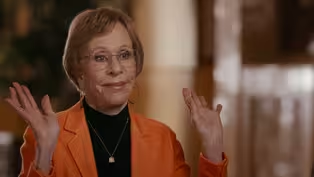Finding Your Roots
Niecy Nash Discovers Her Ancestor's History as Slaves
Clip: Season 9 Episode 3 | 5m 40sVideo has Closed Captions
Niecy Nash reads the first tangible evidence she's seen about her slave ancestors.
Niecy Nash is awestruck when she reads a will that bequeaths her 4th Great Grandfather to a plantation owner's daughter -- the first tangible evidence that she's ever seen of her family's history as slaves.
Problems playing video? | Closed Captioning Feedback
Problems playing video? | Closed Captioning Feedback
Corporate support for Season 11 of FINDING YOUR ROOTS WITH HENRY LOUIS GATES, JR. is provided by Gilead Sciences, Inc., Ancestry® and Johnson & Johnson. Major support is provided by...
Finding Your Roots
Niecy Nash Discovers Her Ancestor's History as Slaves
Clip: Season 9 Episode 3 | 5m 40sVideo has Closed Captions
Niecy Nash is awestruck when she reads a will that bequeaths her 4th Great Grandfather to a plantation owner's daughter -- the first tangible evidence that she's ever seen of her family's history as slaves.
Problems playing video? | Closed Captioning Feedback
How to Watch Finding Your Roots
Finding Your Roots is available to stream on pbs.org and the free PBS App, available on iPhone, Apple TV, Android TV, Android smartphones, Amazon Fire TV, Amazon Fire Tablet, Roku, Samsung Smart TV, and Vizio.
Buy Now

Explore More Finding Your Roots
A new season of Finding Your Roots is premiering January 7th! Stream now past episodes and tune in to PBS on Tuesdays at 8/7 for all-new episodes as renowned scholar Dr. Henry Louis Gates, Jr. guides influential guests into their roots, uncovering deep secrets, hidden identities and lost ancestors.Providing Support for PBS.org
Learn Moreabout PBS online sponsorship-[Henry VO] In the 1870 census, we found Niecy's fourth great-grandfather, Aaron Cobb, living in Union County, Arkansas.
Moving back a decade, we saw that the 1860 census for the same county contained a slave schedule for a white planter named Azaraiah Cobb.
The enslaved people on this schedule are not listed by name.
But even so, we wondered: could Azaraiah have owned Aaron?
We found our answer in the estate records of Azaraiah's father-in-law.
-"I, Joel Brazeale..." -[Henry] Mm-hm.
-"Being in a low state of health but in perfect mind, do make and publish my last will and testament in manner following: I give and bequeath unto my daughter, Rosanna Cobb, one... negro boy named Aaron."
I'll be damned.
Mm, mm, mm!
-So we could confirm with that will what you were seeing without names on the previous page.
-That's them!
-[Henry VO] This will was written by a planter in Tuscaloosa County, Alabama.
His name was Joel Brazeale.
It bequeaths Niecy's fourth great-grandfather Aaron to Brazeale's daughter Rosanna, who had married into the Cobb family.
-Just passin' people around, passin' 'em down.
-And he was just a child.
-[whispering] He was a child.
That is heart-- it's heartbreaking, you know?
-Mm-hm.
-I don't know, it's kinda like-- and it's weird because you grow up knowing what slavery is, you grow up knowing the institution, you grow up still feeling the ripple of what it is for us in today.
But somehow, when you can go back and read this actual document, it still feels like a gut punch.
-Well, it's personalized.
-Yeah.
-You have DNA from Aaron.
It's not some abstract concept anymore.
-No, no no no.
-[Henry] No.
-It's right here.
-[Henry] Mm-hm, it's right there.
-Wow.
-[Henry VO] Digging deeper, we discovered that Joel Brazeale was originally from what was known as Pendleton District, South Carolina.
And, in the 1820 census, we saw that he owned a boy who almost certainly was Aaron.
-And on your left, you could see a map of Joel Brazeale's land in 1825.
Niecy, we believe that that's where your fourth great-grandfather Aaron was born, right there in Pendleton District.
-Wow.
-[Henry] And that area experienced a cotton boom during the late 18th and early 19th century, and the enslaved people on Joel Brazeale's plantation likely worked from sunrise to sundown.
And once your fourth great-grandfather Aaron reached the age of eight, he would've most likely joined them out in the fields.
-Yeah.
Wow.
Mm!
-[Henry] Mm.
-[Henry VO] There is a grace note to this story.
In the 1870 census, we found Aaron living near his son Henry, and we noticed something incredible about Henry: he was a landowner!
At a time when less than five percent of all Black families living in the South owned any real estate, Henry had 850 dollars' worth of property, likely amounting to hundreds of acres.
-Oh man, this is awesome!
-[Henry] It is cool!
-This is awesome!
-[Henry] You got it!
Industrious and saved money!
-Well, especially when you look at all of the hardship, all of the pain, all of the experience, all of the things you're born into, all of the, you know, things that you've seen, witnessed, you know what I mean?
-Oh, yeah.
-And you still said, "I'm gonna figure out a way to take care of my family and be successful."
-[Henry] Right!
What do you think you inherited from him?
-I feel like when you can... [voice wavering] when you can come from something so hard and... that was not just hard because it was hard, hard because it was meant to destroy you... -[Henry] Meant to destroy you.
They made it hard.
-I used to-- when I first started in entertainment, the three words that I would live be are "No matter what."
-[Henry] Hm.
-If I gotta go to an audition to be funny and I'm crying 'cause of this or that, no matter what.
No matter what, you show up and you pull up.
-[Henry] Mm-hm.
-And I feel like my "No matter what" of it all has a different meaning and context when I look at this, because this... is the "No matter what" of it all.
-Literally.
And if they hadn't embraced that philosophy, there'd be no Niecy.
-There would be no Niecy.
-[Henry] Mm-mm.
No matter what.
-My God...
Carol Burnett Learns Who Fought in Wars — and Who Fled
Video has Closed Captions
Clip: S9 Ep3 | 4m 28s | Carol Burnett uncovers some surprising connections between her family and the Civil War. (4m 28s)
Video has Closed Captions
Preview: S9 Ep3 | 32s | Comedians Carol Burnett and Niecy Nash discover scandals hidden within their roots. (32s)
Providing Support for PBS.org
Learn Moreabout PBS online sponsorship

- History
Great Migrations: A People on The Move
Great Migrations explores how a series of Black migrations have shaped America.












Support for PBS provided by:









